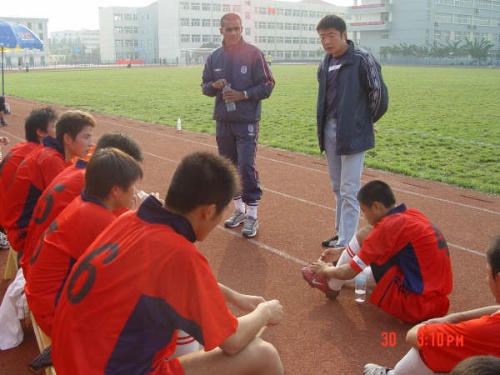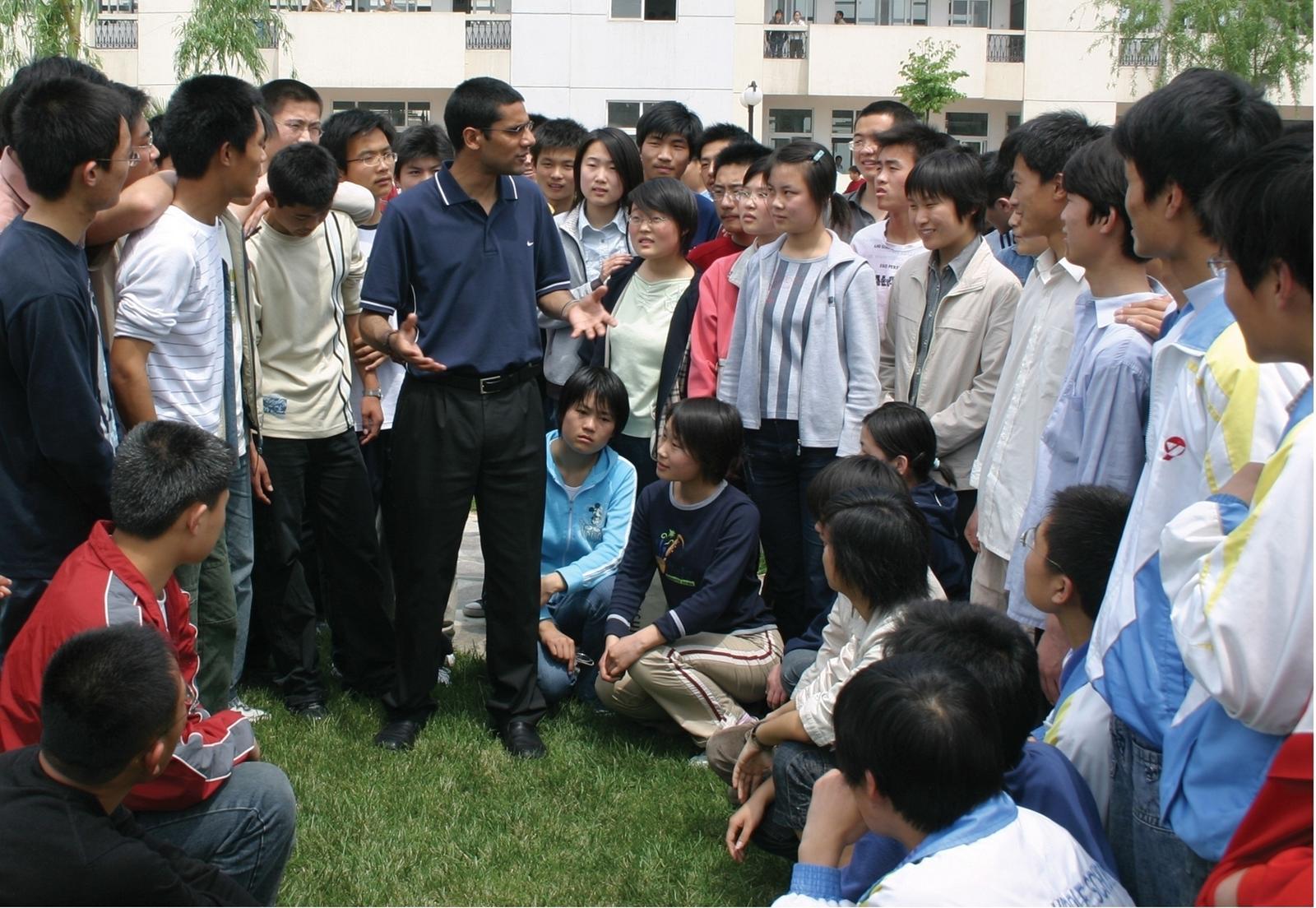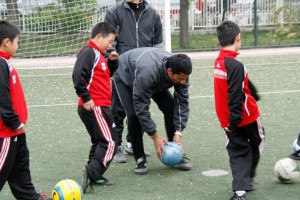Foreign football managers are widespread throughout the Chinese professional leagues, but while there are many laowai coaches in the Super League few apply their knowledge to cultivating Chinese youth development. Terry Singh, an English FA Grassroots coach, has been one of the few in that realm, pushing the grassroots agenda in China for the last ten years. Now with Beijing Sport University Terry had time to catch up with to talk about the grassroots game in China.
: When you first arrived at China it was in Nanjing with Nanjing No. 4 Middle School as a school coach. What was your first impression of scholastic sports in China? And what instructional methods/approaches did you adapt specifically within the context of coaching in China?
T: Everything was prepared by the Chinese partner in advance, so I knew exactly what I was supposed to be doing before arrival. Simply develop football and English programs for different levels within Nanjing. Having already coached in the US, Canada, Germany, and Holland and the adjustment was similar to adjusting to any environment. First, there is plenty of curiosity, and then it’s just about settling in. For the last six years I’ve been increasingly accustomed and seen how the sport has developed.
T: In China there is already a strong background of education and skill mastery, so I try to apply that in lessons. For example the Chinese quote goes, “What I hear I forget, what I see I remember, what I do I know.” Therefore all lessons I give are on the field in game oriented situations. Aside from this I try to be as encouraging as possible and not criticize players.
: Many people believe that with the average Chinese child’s lifestyle (combining factors of single-child law and exam-ridden education system) there is seldom opportunity to play football and almost no opportunity to play organized football. How much do you agree with this? And what strategy would you suggest for clubs and associations facing such obstacles?
T: It is challenging with education structures in place and limited room for Chinese children to play. It will take time, but this will change. The Nanjing Middle School had a strong reputation and history of winning competitions in football so people at the school were more inspired by the sport. Here at Beijing Sport University students are hopeful to land positions in a number of sports industries following graduation. Once other schools of all levels can enjoy similar experiences with the sport there will be more programs.

Nanjing-where Terry made is breakthrough with Chinese football; leading the Nanjing No. 4 middle school to victory in 2004.
: Now you are in Beijing Tiyu (Sport) University, arguably the best sports school in the country, doing a unique English Football Program. What has been the feedback and achievements of the program thus far? What are the long term goals?
T: Some students are enthusiastic; some don’t quite appreciate the value of English in football. I started in 1992, pioneering grassroots international. Football is all I know, the future is hard to tell in China. Everyday is different, but staying professional and keeping enthusiasm in the program will yield positive developments. Because the approach is very student centered, this program has already had great change in attitude from students. Many know the professional field of football, as other sports, is hard to get a job, so many will go to applying their English skills elsewhere.
: There’s much expectation for a country like China, with its rapid development, massive population, and strong interest in the sport, to produce a world class national side. How far do you think the men’s team is from this level? And what should the focal points be to achieving this level?
T: Chinese football at the national level is going through a large transition; with management turnover following several scandals. The national team coach(s) of China were always going to have a difficult job the last decade, and probably the decade to come. Change will happen but it needs to start at the grassroots level, especially with coaching education.

Terry, supporting the coaching education system throughout China, believes that it’s not the players but the Chinese youth Coaches who need more training.
T: Chinese youth coaches are often not educated enough to develop the players as well as other countries’ coaches, they need more quality coaching education.
Yet, very few measures are taken to evaluate the quality of grassroots coaching at its development of the game. Clubs are often narrow minded, and short term oriented, looking to turn a quick profit and later see how it develops. Such clubs expect (and experience) a high level of turnover in coaches and players.
T: Some clubs are even reluctant to offer coaching education for their staff, because the club will then need to raise their salaries or risk losing the coaches to another club. There needs to be a long term plan of coaching education from the top down within each club. Currently the short-termed thinking is counterproductive.
: Currently over half of the managers of Chinese Super League clubs are from outside of China. What is the role of foreign coaches, including yourself, in China? And what is the key to developing Chinese football players?
T: There are quality Chinese players, and it’s often been the organization of them that has failed more than the players. Although it may take a foreign coach to help instill professional thinking within clubs, it takes a foreign coach longer to have an impact on the players than a domestic coach. So having a foreign national coach is not the solution. Homebred Chinese coaches, given time to develop the team, would have a greater impact on the process.
Having foreigners involved in the coaching staff is great, and should be included, but to be a proper football nation it should be organic. Also, good players are not always good coaches; China has not evolved like other nations in this aspect, maybe because the few job opportunities for Chinese coaches first go to former players before forward thinking coaches with less playing experience.
: Closing remarks about Chinese Grassroots Football?
T: Actions speak louder than words. When we are at the forefront of football development, we must put everything in action. When you talk about doing grassroots football, make sure you can back it up with results. Football in China will prosper, but only so much as people are able to put long-term programs into action. I’ve had great experience in China, and hopefully this has made a small difference.
For more information on Terry and his grassroots mission visit http://terrysingh.blog.sohu.com/


Great work Terry (and Trevor). Hope you can make some progress and good luck with everything.
Just one question: If you are teaching English football – how do you say “hoof it” in Chinese? 🙂
Canni, you can contact Terry through his website http://terrysingh.blog.sohu.com/ myself via trevor.lamb@sinobal.net
Yiddo…this is a regular in Chinese coaching…踢掉…’ti-diao!’
So many true words on this article. I am german. With many years player and trainer in different leagues and ages. Now in my last youth …. i would like to move things here in guangdong. Living in Dongguan i can see there is still lots to do. lets bring them up. Coaching Education and of course the basic strategy in Marketing should be coming from outside. From us.. UK and Germany…
How can i come in touch with Terry and Trevor? Let me know.
Greets from Dongguan
Gerhard Canni Carnaghi
being ready for the mission